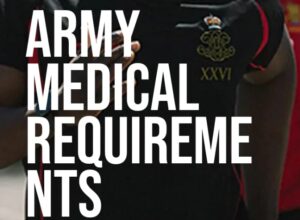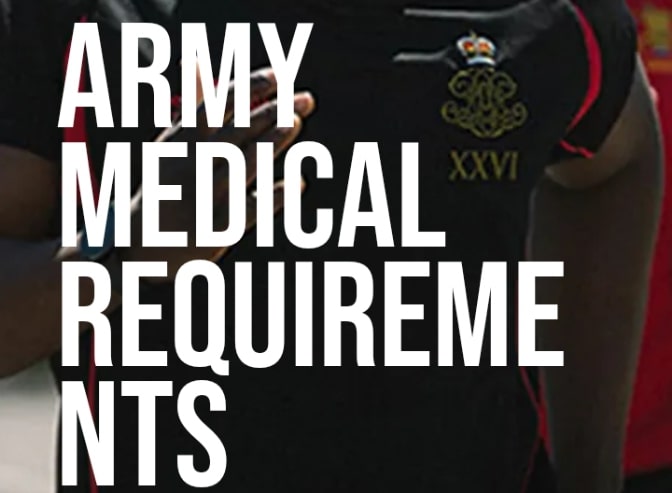British Army Medical Requirements To Join
Why does British Army medical requirements matter? Being in the Army can be challenging both physically and mentally. Therefore, a history of health problems or the presence of health conditions that usually don’t affect your everyday life, can mean that you’re not able to join, or you might have to wait to join.
You will be sent forms asking about your medical history once you’ve submitted your application.
The medical team assess everyone individually, and make their decisions based on their professional opinion in keeping with prescribed army standards. These standards and guidelines are reviewed and amended regularly.
This page contains a brief sample guide to some of the conditions that might stop or delay you being able to join, however this is not an exhaustive list. You can still apply to join the army even if your medical history includes one or more of these conditions. Your application will be assessed on its own merits against medical standards for entry.
Issues
Back problems
- History of spinal surgery.
- Structural abnormalities of the spine and spinal cord.
- History of chronic or recurrent back pain.
Blood diseases
- Sickle Cell disease.
- Congenital spherocytosis.
- Thalassaemia.
- Hepatitis B or C.
- Leukaemia or malignant lymphoma.
- Disorders resulting in abnormal coagulation.
Bone and joint diseases
- Knee injuries and chronic knee pain.
- History of bone fractures.
- Shoulder problems resulting in functional limitations or restrictions of movement.
- Loss of a limb.
- Clubfoot (including past surgery).
- Chronic joint diseases such as ankylosing spondylitis, psoriatic arthritis, rheumatoid arthritis or gout.
- Hypermobility syndrome.
Cardiovascular diseases
- Diagnosis of heart disease.
- Bicuspid aortic valve.
- Symptomatic or medication-suppressed abnormal heart rhythms.
- Cardiomyopathy.
- Hypertension.
Dental health (mouth, teeth and gums)
- Poor dental hygiene, including needing the removal of teeth or ongoing treatment.
Ear problems
- Current perforation of ear drum.
- Chronic ear diseases like cholesteatoma.
- Presence of eardrum ‘grommets’.
- Deafness or hearing problems.
Eye problems
- Chronic eye conditions such as glaucoma, keratoconus and retinitis pigmentosa.
- Damage to the eyelids affecting vision.
- Chronic conjunctivitis.
- Reduction of corrected vision in one eye below army entry standards.
- Diplopia.
Gastrointestinal problems
- Chronic abdominal diseases like Crohn’s disease or ulcerative colitis.
- Significant history of dyspepsia.
- Loss of spleen (splenectomy).
- Active Haemorrhoids.
Kidney and urologic problems
- Congenital kidney diseases/anomalies.
- History of kidney problems such as malfunction of a kidney or kidney stones.
- Recurrent renal colic.
- History of urinary incontinence.
- History of genital infections.
Neurological disorders
- Epilepsy.
- History of head injury with neurological sequalae.
- Migraines.
- Multiple sclerosis.
Psychiatric problems
- Schizophrenia.
- Obsessive-compulsive disorder.
- Alcohol or drug dependence.
- Personality Disorders.
- Eating Disorders.
- Anxiety and Depression.
- Post-traumatic Stress Disorder (PTSD).
- History of deliberate self-harm or suicide attempts.
Respiratory problems
- Asthma (depending on severity and need for treatment).
- Chronic lung disease such as emphysema, bronchiectasis or cystic fibrosis.
- Tuberculosis.
Skin problems
- If you suffer from skin conditions such as severe widespread psoriasis or dermatitis. However, if it’s mild or moderate dermatitis it may be considered.
Other conditions
- Being an organ transplant recipient.
- Food allergy requiring you to avoid some foods in your diet due to allergy or intolerance (not because you don’t like it!).
- Raynaud’s phenomenon.
- Diabetes.
- Some medical conditions requiring long-term medication or replacement therapy.
- Moderate or severe COVID 19 infection.

What if I’m pregnant?
Joining the Army will be delayed if you are currently pregnant or have given birth over the last 3 months.
I used to take drugs, can I still join?
If you have a history of drug dependence, you will need to provide evidence that you have abstained from the use of these drugs for at least the last 3 years prior to joining the Army. A history of occasional use of recreational drugs won’t stop you from joining, but you must stop using any such drugs before you join.
After joining the Army, you must not use recreational drugs. The Army carries out random, compulsory drugs testing, and you can expect to be tested while you’re in training. If you fail any of the tests, you’re very likely be discharged.

